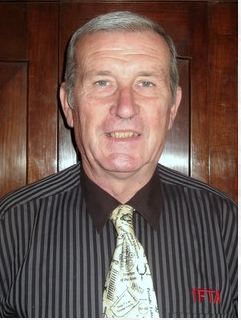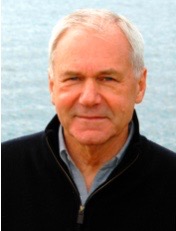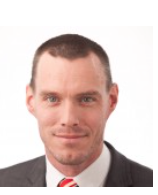Download Presentations
Mr Ian Thomas
Dr Graeme Pearman
Mr David Blowers
Mr Ian Thomas BscHons(ChemEng), MEngSci(EnvEng), FIChemE, FIEAust, FRACI, CPEng
Principal, I F Thomas & Associates
 Existential Risk is the likelihood of our species becoming prematurely extinct. A very small reduction in this risk will save countless future lives and is therefore more important than any other global public good. The author places this little understood risk into a two-dimensional matrix, describes examples and the fundamental changes needed to ensure the future of the human race.
Existential Risk is the likelihood of our species becoming prematurely extinct. A very small reduction in this risk will save countless future lives and is therefore more important than any other global public good. The author places this little understood risk into a two-dimensional matrix, describes examples and the fundamental changes needed to ensure the future of the human race.
We appear destined to catastrophe or even to extinction if we do not collectively address population control, climate change, species extinctions, equality for all people and elimination of greed with its associated mantra of ‘growth at all costs’. The latter should desist in favour of ‘ecological and economic sustainability’. Any entity which has fixed inputs cannot increase its outputs indefinitely. To date, complete economic collapse has been averted by technological advances, by exploitation of the environment and by exploitation of developing nations. Instead of continuing to use technology in this way, we could use it to achieve equality for all, reversal of the greenhouse effect and the halting of extinctions. The author addresses inequality of consumption between the developed world and developing nations. In particular, this involves ‘land-grabbing’ in poorer countries by richer countries to meet their greater consumption needs without regard to the human and other populations it displaces. Although greed is natural for all species, the difference between humans and other species perhaps is that we realise that change is needed and we have the ability to make it happen. This in the author’s view is our collective moral obligation.
Ian Thomas is a chemical and environmental engineer with 25 years of industrial experience and 27 years to date as Principal Partner of I F Thomas & Associates, Consulting Engineers (www.ifta.com.au; ifta@ifta.com.au).
He is a Fellow of the Institution of Chemical Engineers (IChemE), the Institution of Engineers Australia (IEAust), the Royal Australian Chemical Institute (RACI) and the Safety Institute of Australia (SIA).
In September 2016, he submitted a thesis for examination towards the degree of PhD by Research entitled, ‘An assessment of the technical and economic feasibility of using vegetable oil fuels in compression ignition engines, with comments on more fundamental ways to offset the impending post fossil fuel dilemma’. He has presented a number of papers on this and other risk and sustainability oriented projects.
His consulting business assesses and remediates contaminated sites and ensures safety and environmental compliance in the chemical and allied industries. He provides expert reports and evidence to courts, tribunals & planning panels on risk associated matters.
Dr Graeme I Pearman AM, FAA, ATSE, FAMOS, FRoySocVic, BSc(Hon), PhD
 Four decades of international science has refined the theoretical basis, first described in the middle of the ninetieth century, for assessing the influence of atmospheric gases on global temperatures and concomitant changes to the hydrologic cycle, sea levels and the distribution of weather patterns. It has also indentified changes taking place in the natural environment as a result of climate changes underway.
Four decades of international science has refined the theoretical basis, first described in the middle of the ninetieth century, for assessing the influence of atmospheric gases on global temperatures and concomitant changes to the hydrologic cycle, sea levels and the distribution of weather patterns. It has also indentified changes taking place in the natural environment as a result of climate changes underway.
It has provided the basis for anticipating future change related to alternative human activities. But such knowledge is never as complete as desirable, so that its application has to be in a risk management setting, weighing the probability of future changes against the probability of specific impacts of those changes. This presentation will provide a brief overview of the current state of knowledge of what has occurred and what is likely to follow.
The primary influence on the composition of the global atmosphere with respect to climate-changing gases has to do with the human use of fossil fuels, the combustion of which is causing a rise of carbon dioxide levels in the atmosphere. Thus the climate-change issue, whilst demanding that we consider how to adapt to inevitable change to the climate, is also very much about the future way humans source and apply energy. The presentation will briefly describe the nexus between climate change and energy futures.
Engineers have a key role to play in meeting the challenges of both adapting and mitigating climate change. As climate impacts almost everything we do, to say nothing of its impacts on the millions of species with which we share the planet, the opportunities for engineering input are enormous. But, similarly, the evolution of primary energy sourcing and application directed towards a net zero emissions condition during this century, opens up opportunities for new approaches, many of which will demand engineering solutions.
That having been said, it is important that engineers work with physical, biological and social scientists to ensure that the fact that when, from an engineering perspective, options may be possible, the potential solutions are tested against other criteria of physical, biological, economic and social realities.
Dr Graeme Pearman joined CSIRO, in 1971 where he was Chief of Atmospheric Research, 1992–2002. He contributed over 200 scientific journal papers primarily on aspects of the global carbon budget. He is now a consultant, Adjunct Senior Research Fellow at Monash University and Professorial Fellow, Melbourne University.
He was awarded the CSIRO Medal (1988), a United Nation’s Environment Program Global 500 Award (1989) and a Federation Medal (2003).
Graeme is a member of the Board of the Climate Institute (Sydney) and past board member of START International (Washington) and Greenfleet Australia (Melbourne). He is a Science Advisory Panel member of the Australian Centre for Corporate Responsibility (Canberra) and until recently the Singapore National Research Foundation (Singapore) and the German Council of Science and Humanities (Berlin).
Current interests include describing holistic strategies that build resilient energy futures and emissions reductions appropriate for specific nations or communities; transport technologies and limitations and risks associated with bio-fuels; dimensions of human behaviour in the climate-change issue; and the role of science in modern societies.
Mr David Blowers
 For most of the last decade, Australia’s politicians have failed to find an adequate policy solution for the ‘wicked problem’ that is climate change. Obsession over the impact of policies on prices and, in particular, the price of electricity has got in the way of developing sensible policy that targets emissions reductions across the economy at least cost. Sadly, our two major political parties seem as far away from a solution as ever meaning that much-needed investment in the development and deployment of low-emissions technologies is unlikely.
For most of the last decade, Australia’s politicians have failed to find an adequate policy solution for the ‘wicked problem’ that is climate change. Obsession over the impact of policies on prices and, in particular, the price of electricity has got in the way of developing sensible policy that targets emissions reductions across the economy at least cost. Sadly, our two major political parties seem as far away from a solution as ever meaning that much-needed investment in the development and deployment of low-emissions technologies is unlikely.
David’s presentation will briefly summarise Australia’s political history relating to climate change policy and outline the difficulties in forming a long-lasting emissions reduction policy. It will discuss the different policy options open to government along with their relative costs and benefits. Finally, the presentation will look at the challenges facing the electricity sector in transition as well as the opportunities that may occur as a result of proactive government action.
David Blowers has been Energy Fellow at the Grattan Institute since 2014. He has extensive experience developing both energy and broader public policy in both Australia and the UK. Prior to joining Grattan, he spent three years working on energy and earth resources policy for the Victorian State Government, where he led the review of the Victorian Energy Efficiency Target scheme.



